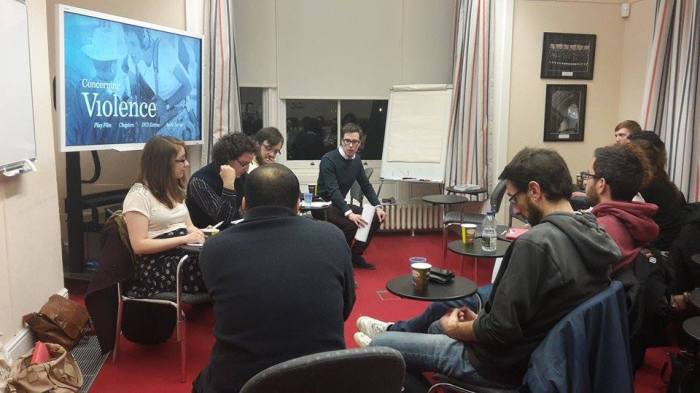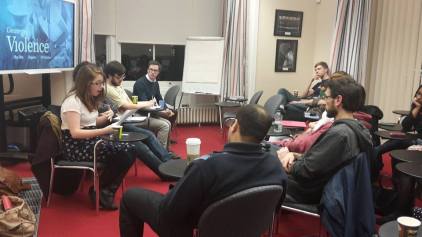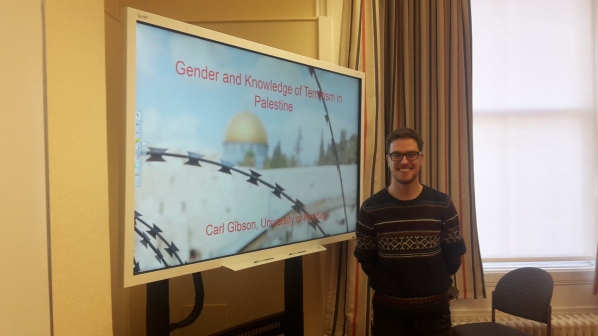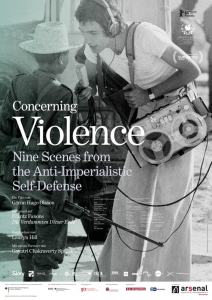
On Monday 23rd March around 20 PhD students gathered in the Graduate School to watch a screening of the film ‘Concerning Violence’ written and directed by Göran Olsson. After the film there was a panel discussion. The members of the panel included the chair Carl Gibson, and other panelists Yanos Soubieski, Joshua Wells and myself (Maria Tomlinson). We spoke not only about the film but also about Fanon’s work itself. We questioned whether violence was necessary and what its effects were upon the colonised subject. After this there was a lively debate on the issues raised by the panel.
As I am the co-organiser of the Gender and Sexuality Research Network, alongside Sophie Payne who we thank for her technical support, I spoke about the relationship between decolonisation and gender. Here is a summary of the issues I raised in my presentation:
I noted that Fanon barely alludes to women in The Wretched of the Earth. He speaks only of the colonised man. Fanon writes that this colonised man learns from the coloniser that he needs to express himself as an individual. I asked, ‘And the colonised woman? What about her need to express herself?’ She is doubly oppressed by colonialism and patriarchy. I noted that the film ‘Concerning Violence’ did question the lack of women in Fanon’s work by bringing women back into the picture. We see and hear from Mozambiquan women who fight in guerrilla armies for the liberation of Mozambique. These women appear hopeful for a future of equality because they have performed exactly the same duties as men during the war. We know, however, that this emancipation did not occur. As Gayatri Chakravorty Spivak says in the preface of the film, when the new postcolonial state emerges women will once again be oppressed by gender structures.
I then went on, with reference to theorists such as Ann McClintock and T. Deanen Sharpley Whiting, to discuss a text in which Fanon does consider the role of women in the war, Algeria Unveiled. In this text he looks at how veiling was used during the Algerian War of Independence. He writes that Algerian women initially removed their veils and walked around in Western clothing when passing on messages or carrying weapons in order to not arouse the suspicion of the colonisers. Later, women re-donned the veil in order to conceal weapons. Fanon seems to see this as the women having agency, and using their bodies in order to liberate their country and themselves. He believes that because women fought bravely alongside men in this war they would be rewarded with emancipation afterwards. Of course, he has been proven incorrect, not only about the existence of female equality and agency after the war of liberation but also during it. In fact, Fanon’s description of a woman as a hidden resource undermines the idea of female agency he is trying to evoke, as his patriarchal language objectifies these women and identifies them as simply another weapon in the war effort. The Algerian woman is an object, as are the bombs and guns that are used against the enemy.
went on, with reference to theorists such as Ann McClintock and T. Deanen Sharpley Whiting, to discuss a text in which Fanon does consider the role of women in the war, Algeria Unveiled. In this text he looks at how veiling was used during the Algerian War of Independence. He writes that Algerian women initially removed their veils and walked around in Western clothing when passing on messages or carrying weapons in order to not arouse the suspicion of the colonisers. Later, women re-donned the veil in order to conceal weapons. Fanon seems to see this as the women having agency, and using their bodies in order to liberate their country and themselves. He believes that because women fought bravely alongside men in this war they would be rewarded with emancipation afterwards. Of course, he has been proven incorrect, not only about the existence of female equality and agency after the war of liberation but also during it. In fact, Fanon’s description of a woman as a hidden resource undermines the idea of female agency he is trying to evoke, as his patriarchal language objectifies these women and identifies them as simply another weapon in the war effort. The Algerian woman is an object, as are the bombs and guns that are used against the enemy.
Finally, I concluded that Fanon may be correct in saying that the only way to achieve decolonisation is through violence. The violence of the Algerian war did lead to an independent state and indeed women played a huge part in this success. However, violence appears very much the arena of men, it brought little benefit to those Algerian women who fought bravely alongside them hoping for an emancipated future. These women are now trying to forge a path towards liberation through their voices and writing… But are the voice and pen really more powerful than the sword? This remains to be seen.
Thanks again to everyone who came and Carl for organising everything! I really enjoyed offering my perspective on the question of gender and violence, and furthermore listening to everyone’s opinions on the matter.
Please comment below if you would like to continue the debate!



